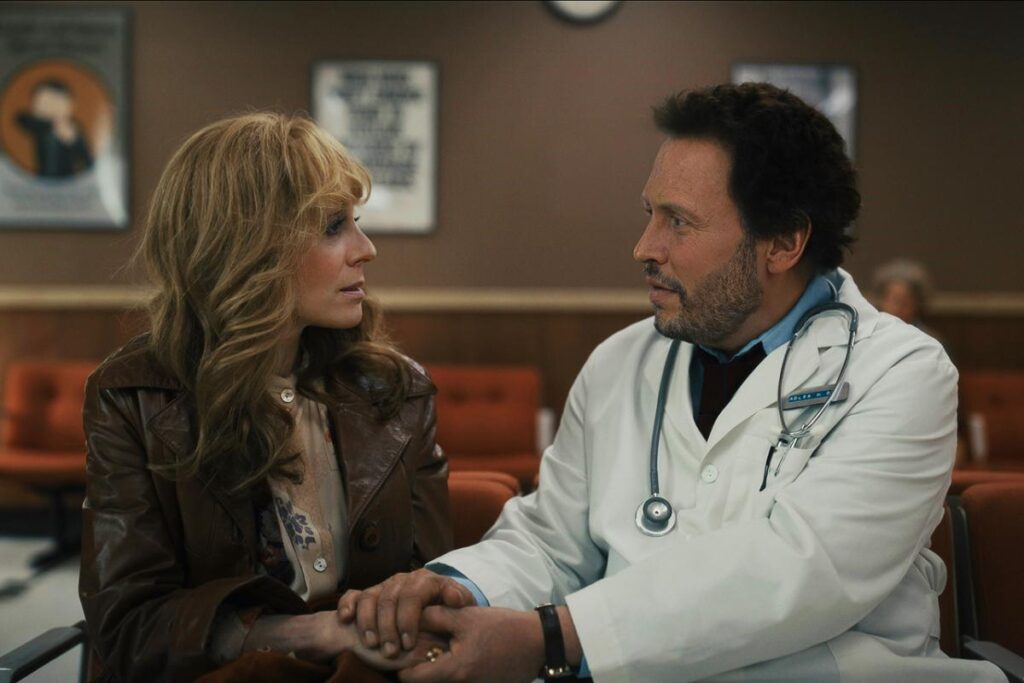Dr. Eli Adler deserves an award. Actually, he deserves to lose his medical license, then he deserves an award. How else to process the chaos that results from his unauthorized wormectomy on the forehead of his troubled young patient, Noah? I mean, you’re definitely not supposed to just make a three-inch incision on a child’s head without permission on a hunch in a hospital. It’s just not done. On the other hand, when said incision and imaginary-worm extraction results in curing not only the patient’s paralysis, but that of all the other kids who went down with mass-hysteria symptoms when he first seized up…I mean, contact the major medical journals, because this guy’s a genius. Let’s just not mention the fact that he actually saw the imaginary worm he thought he was extracting. An unnecessary complication for the narrative!
“Fever Dream,” the sixth and best episode of Before to date, does more to advance Noah’s case than seemingly the five previous episodes combined. And it’s not because of Eli’s unauthorized surgery works, mind you. Noah soon regresses, mentally if no longer physically. He sees bees crawling in and out of his increasingly desperate foster mom Denise’s face, injuring her arm. He shoves her with tremendous strength, knocking her to the floor. (Eli senses this halfway across town.) When Eli returns, Noah has only one message for him, scrawled on a crumpled-up piece of paper: “GO AWAY.” No, the worm removal was a temporary reprieve, not a cure.
What actually advances the case is this:
That’s a digitally de-aged or deepfaked Young Judith Light, meeting cute with a similarly youth-ified Billy Crystal. Look, I know there are all sorts of issues surrounding this kind of technology — from the use of dead actors’ likenesses (not applicable here, fortunately) to the way a lack of consistency between de-aged actors and recast actors used to portray young versions of older characters can get confusing (it really threw me for a loop in Disclaimer, for example). But I’d be lying if I said I didn’t get a real gee whiz! feeling from seeing convincing versions of Crystal and Light in their early days as actors having an emotional moment together. I like Soap and Who’s the Boss? as much as the next guy, you know?
But storywise, all that is beside the point. The real point — a point Eli has studiously avoided acknowledging this whole time, perhaps even to himself — is that his late wife Lynn’s troubled boyfriend Benjamin Walker was not a complete unknown. He was, in fact, Eli’s patient. That’s how he and Lynn met in the first place: He tried and failed to treat Benjamin, a junkie with a history of mental illness and hallucinations, and as a result he met Benjamin’s girlfriend.
Could he possibly have blocked this out? Generally speaking, I think even doctors with a lot of experience would vividly remember losing a patient who happened to be the boyfriend of the woman they’d go on to marry themselves. For whatever reason, and it could be as simple as shame over “stealing” Lynn from a dying man, Eli has avoided making this connection all series long, until now.
But man oh man, what a connection! With help from his increasingly distressed assistant Cleo, Eli tracks down Benjamin’s old house and meets with his brother Lawrence (Lenny Venito, the most Noo Yawk looking man alive and a welcome presence on any number of prestige TV shows dating all the way back to The Sopranos). Lawrence, whom we meet in pajamas as he fixes a broken chair in a house piled with random boxes of stuff and, inexplicably, Phillies memorabilia, had cut Benjamin out of his life prior to his death. Lawrence loved his big brother, but after a wonderful day together his big brother stole all his baseball cars so he could sell them for drugs, and Lawrence cut him out of his life. That’s a bitter, convincing little detail, especially coming from an actor as naturalistic as Venito.
Also, I love how he responds when Eli asks if he or his brother or anyone in their family spoke Dutch. “Dutch? Are you fuckin’ with me right now?” Only in New York, kids!
But it isn’t until Eli gets a good look at Lawrence’s necklace that he makes the real connection. It triggers his memory of Benjamin wearing that same necklace when Eli delivered chest compressions in an attempt to save his life; he succeeded only in breaking the man’s ribs, not that anything else could have been done. But the key thing is this: The bruise left on Benjamin’s chest matches the wine-stain birthmark on Noah’s. Are we talking reincarnation here?
The bigger question for Eli right now, though, is whether figuring this out will even matter. When Denise shows up at Eli’s house desperate for answers, she sees his big conspiracy wall and decides, you know what, maybe Dr. Eli isn’t the right caretaker for her boy after all. And it’s like, it’s hard to blame her. I wouldn’t have wanted Claire Danes solving terrorism crimes in Homeland Season 1 or Jodie Foster working the case in True Detective Season 4 if I’d seen their big crazy photo-and-file arrays either.
Directed with verve by Desta Tedros Reff from a script by Emmanuel Osei-Kuffour Jr., this episode features series-best work from Billy Crystal and Rosie Perez, the arrival of an endearing character actor in Venito, the use of Hope Davis as Crystal’s skeptical colleague and Ava Lalezarzadeh as his beleaguered assistant, the (to me, anyway) delightful appearance of Young Billy Crystal and Young Judith Light, the surprise connection between Eli and Benjamin, and the show’s most effective horror imagery to date in the form of the bees crawling in and out of Perez’s face (CGI insects, with their mechanical movements, are much more convincing than the comparatively fluid and therefore fake-looking CGI worms). If this is the way the show is gonna head into the home stretch, I’m ready to follow it there.
Sean T. Collins (@theseantcollins) writes about TV for Rolling Stone, Vulture, The New York Times, and anyplace that will have him, really. He and his family live on Long Island.
Read the full article here








